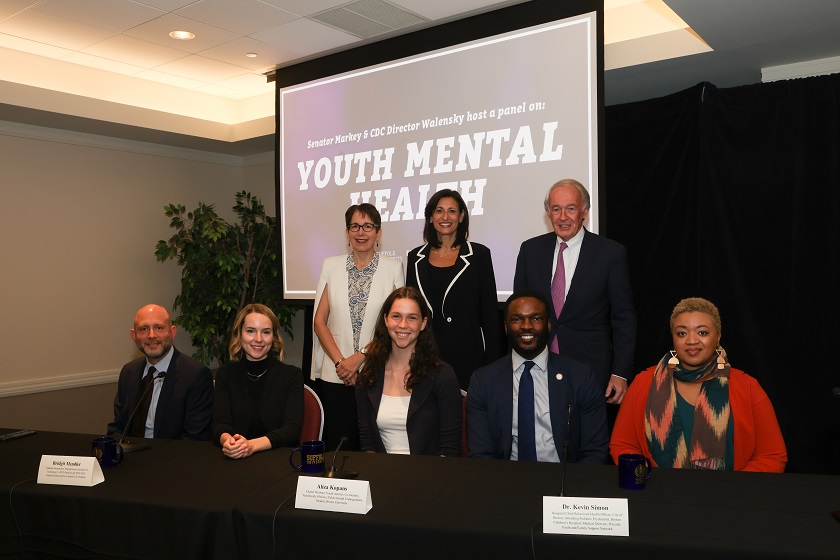Taking on 'Big Tech' to Stem Youth Mental Health Crisis

Legislators and parents must curb the reach and manipulation of “Big Tech” to safeguard the mental health of young people, according to experts at a recent panel discussion convened by Suffolk University, Senator Edward J. Markey (D-Mass.), and Centers for Disease Control and Prevention Director Dr. Rochelle P. Walensky.
Nationwide, there has been an alarming rise in recent years in rates of depression and suicide attempts among teenagers. According to the CDC, suicide was the second-leading cause of death in 2021 among kids ages 10 to 14. In the past year, one in three high school girls contemplated suicide, and an estimated one in ten attempted it. One in five LGBTQ+ teens reported attempting suicide. In late 2021, the American Academy of Pediatrics declared a “national emergency” in children's mental health.
Markey, who was first elected to Congress in 1976, has filed legislation to address what he described as a chief driver of the crisis, the influence of giant internet companies and
sophisticated data-gathering processes that deliberately target vulnerable children and teens.
“There is a straight line from the glaring lack of privacy protections for children and teens online to the decline in young people's well-being,” Markey told the panel’s audience of educators, advocates, and lawmakers. He criticized Big Tech for collecting data about kids and teens, and “using it against them to serve up an endless stream of toxic content that grabs their attention.”
How Big Tech targets vulnerable teens
Social media and digital wellness experts on the panel included Josh Golin, executive director of Fairplay, Bridgett Mendler, researcher at the MIT Media Lab, and Aliza Kopans, a student and youth advocate.
Golin described how digital companies were targeting youth users on social channels and in advertisements with messages that exploit their interest or vulnerability to dieting, nicotine use, gambling, and alcohol abuse, or manipulate life stresses like parental divorce or illness.
Social media companies have even been found to brag to advertisers that they “could target teens at the exact moment that they were feeling bad about themselves, including when they were feeling bad about their bodies,” Golin said. “When we think about how hard it is to be a teenager already, and how much kids struggle with what they look like and how they feel, using that as a marketing opportunity to exacerbate that is just beyond the pale. This is one reason why we need to ban targeted marketing to kids.”

‘Meeting this generation where they are’
Aware of the pressing need to help students foster connections and increase resilience, Suffolk has expanded and deepened its “campus-wide culture of caring,” said President Marisa Kelly, citing the negative impact of COVID restrictions on students’ well-being, compounded by relentless exposure to technology and social media in middle and high school.
“We understand how important this conversation is,” she said. “We believe that we need to be meeting this generation where they are, as opposed to saying ‘This is where you should be, please catch up.’ As a university, we are looking at how we can engage our entire community in the area of mental health.”
Other panelists described lengthy wait times and scarce resources for children when they reach a crisis point. Dr. Kevin M. Simon, Boston’s chief behavioral health officer, said the city recently launched a pilot program to train 200 new social workers and other specialists who will work for three years in the city’s behavioral health centers and schools. Myisha R. Rodrigues, PhD, LMHC, executive director of the National Alliance on Mental Illness of Massachusetts, said progress was specifically needed in communities of color and among families struggling with housing insecurity.
Walensky, who recently announced she will step down from her post in June, said new federal initiatives to reduce emergency department visits, support traumatized youth in schools, and add badly needed mental health services were starting to help, but more resources were needed at the state and local levels for progress to continue.
“We must create settings in which our children feel safe and supported and link our youth in crisis to treatment. And while we do these things, we must also work to reduce the long-standing inequities and root drivers of our youth mental health crisis,” she said.
Taking aim at the digital media root of the issues, Markey, along with Senator Bill Cassidy (R-La.), recently reintroduced the Children and Teens’ Online Privacy Protection Act (COPPA 2.0), legislation that, if passed, will update children’s privacy laws, prohibit the collection of data on users ages 13-16, create a digital marketing bill of rights that limits the collection of personal information of teens, and establish a youth marketing and privacy division at the Federal Trade Commission.
The proposal has so far gained bipartisan support in the Senate, as well as endorsement by a wide coalition of mental health and youth advocates. “We have a moral responsibility to get this job done,” Markey said.
As seen in the Fall 2023 edition of Suffolk University Magazine



